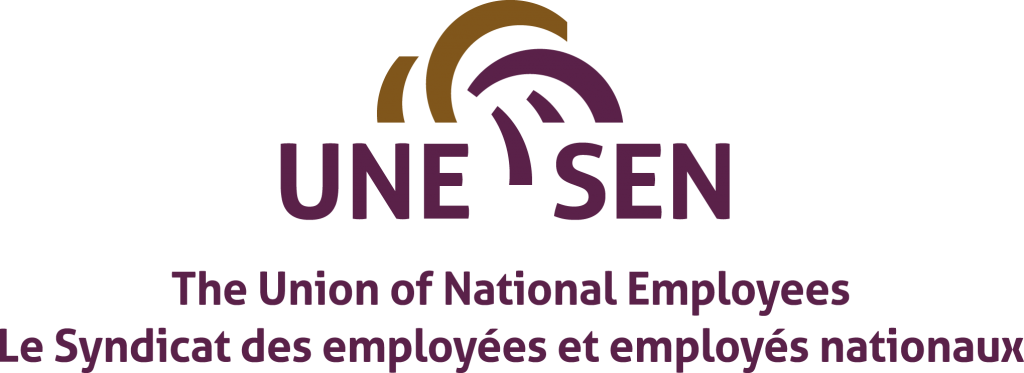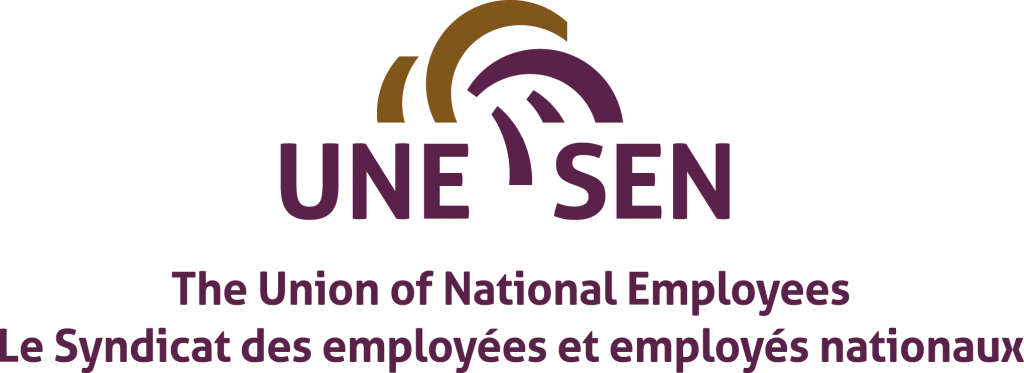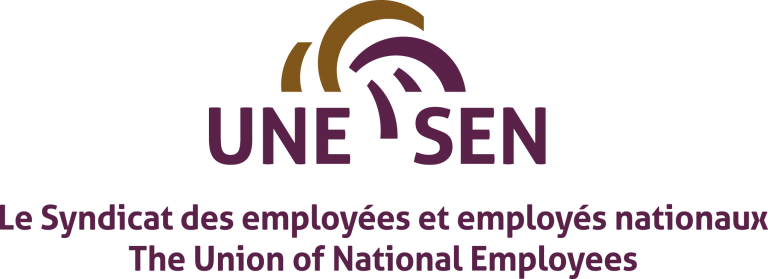
June 24, 2021
The members of the UNE Francophone Committee wish Happy Saint-Jean-Baptiste Day, Quebec’s national holiday, to all Quebec UNE members and those celebrating it across the country!

June 24, 2021
The members of the UNE Francophone Committee wish Happy Saint-Jean-Baptiste Day, Quebec’s national holiday, to all Quebec UNE members and those celebrating it across the country!

June 23, 2021
On June 21, National Indigenous Peoples Day, two important bills received Royal Assent. Bill C-15, titled United Nations Declaration on the Rights of Indigenous Peoples Act, and Bill C-8.
The first piece of legislation “provides that the Government of Canada must take all measures necessary to ensure that the laws of Canada are consistent with the United Nations Declaration on the Rights of Indigenous Peoples, and must prepare and implement an action plan to achieve the objectives of the Declaration.”
The second piece of legislation “amends the Citizenship Act to include, in the Oath or Affirmation of Citizenship, a solemn promise to respect the Aboriginal and treaty rights of First Nations, Inuit and Métis peoples, in order to respond to the Truth and Reconciliation Commission of Canada’s call to action number 94.”
We wish to acknowledge the passage of these bills as part of the 2015 Truth and Reconciliation Commission of Canada’s recommendations. We also acknowledge remembrance of centuries of hostilities, persecution, and attempted assimilation of Indigenous peoples in Canada through colonization.
We condemn unequivocally the resistance and angst portrayed by many Conservative federal politicians regarding the adoption of Bill C-15. These matters took too long to be addressed, but these are necessary steps toward reconciliation with Indigenous peoples and towards building a society that enhances Indigenous-government relations.
Respectfully and in Solidarity,
Kevin King
UNE National President

June 9, 2021
Members of the Union Family,
We have now entered Pride Month and you will be seeing many activities happening across the country. I wanted to take a moment to celebrate this great country. Pride in Canada starts around the end of May and happens across the country until September. Pride means something different to each person. For some it is a protest for change, a festival to celebrate what has been achieved, a time that we can explore and find out who we are, be our authentic selves, be with our chosen family and many more personal ways and reasons. Those journeys and thoughts on pride are personal and varied. I hope that in this difficult time that we all stay safe, know you are not alone and there is union family out there for you if you need us. We are all here in solidarity for a diverse and inclusive Canada.
Here are a few sites that you can use to explore and some comments from other members of our union family:
Canadian Virtual Hospice – Two-Spirit and LGBTQ+ Proud, Prepared, and Safe
I love that Pride just gets bigger and brighter each year and that it celebrates every part of our diverse community and gives us all a platform to be visible and open with each other and with our many incredible allies. That being said, there are still people who aren’t fully or fairly represented, and we need to keep pushing the envelope by ensuring we are being as inclusive as possible to enable historically marginalized queer voices to be heard, validated and celebrated too.
Andrew Shaver – UNE National Executive Vice-President (he/him)
Pride for me means members of the 2SLGBTQ+ community being healthy as their authentic selves. Locally, private online discussions are used to find doctors that are friendly to the gender diverse. This should not be necessary; we should have equal access to healthcare without fear! UNE can advocate for improved healthcare and Pharmacare for the 2SLGBTQ+ community within their workplaces and beyond. It should also include expanded mental healthcare. Current access to the healthcare needs of the 2SLGBTQ+ community is limited and includes long wait times. The Yukon recently developed a new gender-affirming healthcare policy. I would love to see this same comprehensive transgender and gender diverse health and wellness policy advocated for Canada-wide!
Danielle Palmer – UNE Regional Representative for Human Rights, Alberta & NWT & NU
Each year, in June, the LGBTQ2+ community celebrates Pride month. We march every year, to help create awareness and support from the community we live in. We continue our fight year after year because of oppression, and the fight for equality to live our lives as our true selves. It’s also an opportunity to acknowledge that the fight for equality is not over. As long as discrimination on sexual orientation, gender identity, gender expression, or any other forms of discrimination exist we will continue to use our voices loud and proud.
Keith Lemoine – UNE President and Human Rights Representative, Local 10512
Pride was originally a riot, a fight for equal rights, to love who you love, to be who you truly are. 52 years later we are still hearing stories of people attacked for being their authentic self, of people being murdered for living as the gender they are instead of the gender society has assigned them, and of youth being forced from their homes and their family for not conforming. Our fight for equality is not over. We, as Union members, need to educate ourselves and others, so that we may all truly be equal. We all deserve respect, access to medical care, mental health resources, housing, community, and family support. Real love is just love, regardless of gender, or sexual orientation.
Janet Eileen Connor – UNE Regional Representative for Human Rights, Ottawa-Treasury Board
Yours in Solidarity,
Chris Little-Gagné (he/him)
UNE National Equity Representative for Lesbian, Gay, Bisexual and Transgender People

June 4, 2021
After months of preparation, bargaining teams for the PA, SV, TC and EB groups are now gearing up for their first meetings with the employer in June. They’ll aim to build on the gains negotiated in the last round of negotiations and put forward proposals that reflect the new realities of our post-pandemic workplaces.
This spring, Treasury Board members took part in the first virtual PSAC National Bargaining Conference, where they reviewed and prioritized the bargaining proposals submitted by PSAC members from across the country, and elected their bargaining teams.
At the common issues table, the bargaining team will negotiate proposals that encompass the needs of all federal public service workers employed by Treasury Board, while teams at each table will negotiate improvements specific to their membership.
Bargaining dates:
To support your elected bargaining team members, we encourage you to download and use your team’s virtual background for all your work meetings and swap out your social media profile picture during National Public Service Week, June 13–19.
Bargaining graphics:
Over the next few months, we’ll launch some exciting new engagement tools to help you build support for your team. We are also organizing opportunities for members to learn more about the bargaining process and how to engage with colleagues virtually.
Your commitment to Canadians throughout the pandemic has been invaluable, and we’ll continue to fight for a contract that reflects that. Make sure to keep your contact information up to date to receive all the latest updates and stay connected with your PSAC regional office as we prepare to negotiate your next contract.

June 2, 2021
The UNE membership has been deeply affected by the discovery of 215 Indigenous children’s remains at the site of the former residential school in Kamloops BC.
Not only is this an almost unspeakable atrocity, within the nation we call Canada, but this has deeply affected many of our members, especially those who work as public servants with Indigenous Services Canada, (ISC) and Crown Indigenous Relations and Northern Affairs Canada (CIRNAC).
It is most difficult for our members to concentrate on work and family-related tasks when this pall of shame confronts them in dealing with their employer and to Indigenous peoples they serve.
Everyone needs to do more than display a backdrop, draped in orange, that states “Every Child Matters”.
We demand that the federal government search all residential school sites, and repatriate all those buried at Kamloops, and all other residential school sites, regardless of cost, and as expediently as possible. We also demand the federal government stop fighting St. Anne’s Residential School survivors in court over the release of documents.
You can read PSAC’s statement on this critical issue.
Respectfully submitted and in Solidarity,
Kevin King
UNE National President

May 28, 2021
PSAC will defend the use of 699 leave for federal public service workers during the pandemic at adjudication hearings with the Federal Public Service Labour Relations Board August 30 to September 3, 2021. This will be a virtual public hearing.
PSAC filed several policy grievances with Treasury Board, CFIA and other agencies for restricting the use of 699 leave for members who were unable to work because of child care, elder care, disability or other issues brought on by COVID-19. We will also be challenging Treasury Board’s policy that forces members to exhaust all other available leave like vacation, sick, or family leave before they can access 699 Leave for COVID-19-related reasons.
The restrictions disproportionately impact marginalized groups who have been the hardest hit by the pandemic, including women, Indigenous people, racialized employees, workers with disabilities, high-risk workers and workers with family obligations. This violates both members’ collective agreements and the Canadian Human Rights Act. PSAC will also be filing a human rights complaint with the Canadian Human Rights Commission.
PSAC has combined the Treasury Board policy grievances so that they can be heard together at adjudication to speed up the process, and grievances filed with agencies will be on hold until the Treasury Board hearing is resolved.
We continue to fight to ensure that all PSAC members – especially those most affected – have the support they need to get through the pandemic. If you need leave related to COVID-19, you should continue to request 699 leave, and if your request is denied or you’re forced to take other types of leave like vacation, family or sick leave, you should immediately reach out to your PSAC representative or your component labour relations officer to discuss whether you should file an individual or group grievance.
Members employed by Treasury Board and PSAC-UTE members are also eligible for paid 698 leave to attend COVID-19 vaccination appointments.
We’ll continue to provide regular updates throughout the adjudication process.

May 31, 2021
To enter the conversation around disability inclusion, first consider the concept of disability exclusion. Have you ever experienced it?
Have you ever been excluded because of disability? I have.
Have you ever been unconsidered because of disability? I have.
Have you ever just been left out and not understood why? I have.
Persons with a disability have struggled to be included into the fabric of society on an equal and equitable keel. Things that some take for granted are barriers to others.
A single step in front of a building doesn’t seem like much of a barrier, unless you have a mobility disability.
A movie theatre seems to be barrier free, unless you are deaf and there is no closed captioning.
An elevator seems to be an accessibility tool, unless you are blind and braille is absent from the floor indicator keyboard.
What does accessibility mean? Is that ever a concern or even a consideration for most people?
Accessibility is about more than removing barriers. It is about creating spaces and situations where everyone feels welcomed, even invited, so that they can participate obstruction and discrimination free.
National AccessAbility Week (NAAW) is an opportunity to:
I was recently contacted by a student from about 28 years ago. He was a student in the school where I taught, but was not a student in my class. He recounted one of his remembrances. He shared the following:
“One day he observed a student making fun of me behind my back. I had heard the student, and addressed them. I explained why my gait was as it was. I offered them an opportunity to experience, in a limited way, what I experience with every step. I suggested that the student place a lift under their shoe equivalent to the size of a 2×4 to create a leg length discrepancy and to then walk around and observe the changes to their gait. They explained that that moment had a profound affect on them and was the moment when they learned about empathy, to view things from another’s perspective, and to not judge. They stated that they went home and tried the experiment themself.”
If we are going to affect a cultural change with respect to the perception of accessibility, we need to focus the conversation on removing barriers, enhancing inclusivity and recognizing the diversity of contributions by persons with disabilities. As was the student, we all need to become participants in the change.
It is only by working together that we will achieve a truly accessible and inclusive society that leaves no one behind.
Michael Freeman,
UNE National Equity Representative for Persons with Disabilities

May 27, 2021
As part of the National Joint Council (NJC) cyclical review, the Travel Directive will be revised in Fall 2021. The purpose of the Travel Directive is to provide a framework meant to reimburse employees for reasonable expenses incurred while travelling on government business.
The reviewing process differs from traditional collective bargaining. To ensure that we succeed in achieving this process, member participation and direct input is critical.
The Directive applies to federal public service workers under Treasury Board, as well as employees of the Canadian Food Inspection Agency, Communications Security Establishment Canada, the National Research Council and the Office of the Auditor General of Canada. The Travel Directive as well as other NJC Directives are part of the employee’s collective agreements.
The 18 public service bargaining agents, including PSAC, provide proposals collectively to the employer representatives. If you are a PSAC member covered by the NJC Directive, you can submit proposed changes by completing the attached form. Proposals should apply as broadly as possible (not specific to one situation) and need to be supported by your Component president.
Please submit your proposals for changes to Andrea Dean by no later than Monday, September 13, 2021 in the Input Call Form.
The proposed changes will be compiled and vetted by the Ad Hoc NJC Committee to the NBoD, as well as the PSAC Representative on the NJC Travel Committee before being consolidated with the proposals from other bargaining agents.

May 20, 2021
Friends of the Union Family,
UNE has endured a long-standing internal Union matter with respect to the representation of Passport Program Employees employed by Immigration, Refugees and Citizenship Canada (IRCC), and operationally administered by Employment and Social Development Canada (ESDC).
A ruling by current PSAC President Chris Aylward in April 2021 has upheld a previous ruling by former PSAC President Robyn Benson in 2015.
UNE has relied on Sections 8,9 and 27 of the PSAC Constitution with respect to past and current jurisdictional matters associated with Component allocation of membership.
From the PSAC Constitution Section 8, sub-section 3 (a) under “Components”:
“The members of the Components listed in Sub-Section (2) of this Section may continue to enjoy the right of membership in their respective Components regardless of whatever employer reorganization takes place.”
Passport Program used to belong to the Canadian Department of Foreign Affairs and International Trade (DFAIT) (now Global Affairs Canada) before a government reorganization by the Harper Conservatives in 2013. Passport Program employees performed – and continue to perform – a well-defined function within distinct directorates of IRCC and the operations of Passport Program client services through ESDC.
UNE is proud to represent its 2000 plus Passport members that give Canadians the opportunity to obtain passports for business and personal reasons, along with consular services for diplomatic missions outside of Canada.
Should issues arise with allocation of PSAC membership within IRCC or ESDC, UNE will ensure that all represented PSAC incorrectly assigned members to our Component will be reassigned to the correct PSAC Component with minimal delay; the same arrangement applies with other Components that share membership with other departments and agencies that have unionized employees under the same bargaining certificate.
You will find the recent decision by PSAC National President Chris Aylward with respect to Passport Program members below.
Respectfully Submitted,
Kevin King
UNE National President, PSAC

Our union owes a great debt to countless members who put themselves forward and run as candidates for elected positions. Whether at the national, regional or local level, these individuals offer an invaluable service to their members.
During Convention, we will hold elections for the following positions:
• National President
• National Executive Vice-President
• National Vice-President for Human Rights
• Assistant National Vice-President for Human Rights
• Regional Vice-Presidents
• Assistant Regional Vice-Presidents
• Regional Human Rights Representatives
• Alternate Regional Human Rights Representatives
• Delegates and alternates to the PSAC Convention
Any member in good standing may run for any of these positions, whether or not they attend Convention. The nomination form is available on the website. If you wish to run for a position, please ensure that your form is sent to the attention of Ateau Zola.
Your form can be mailed, faxed or emailed no later than 1 p.m. Eastern Standard Time on Wednesday September 15, 2021.
900-150 Isabella Street
Ottawa (ON) K1S 1V7
Fax: 613-560-4208
Email: ateau.zola@une-sen.org
Subject line: Nomination for Elected UNE Position
Nominations may also take place on the Convention floor for national positions and in the regional caucuses for any of the other positions. The forms are not required for delegates running from the floor.
If you are considering running for office, you should have a clear and complete understanding of our Policy FIN 9, which will give you all the important details about campaign spending limits and ethical considerations. All candidates must provide a written report of all expenses, even if no expenses are incurred.
Delegates are entitled to make informed decisions on issues which will be presented to them, including the election of UNE officers. Similarly, members who run for elected office within the UNE have the right and responsibility to communicate with Convention delegates. As a result, upon request, candidates are entitled to receive delegate personal contact information. Personal contact information includes name, address, phone number and email address. The personal contact information of delegates will be shared on a need-to-know basis only. Therefore, candidates may only obtain personal contact information on members who are entitled to vote on the position for which they are seeking elected office. Candidates may only use this information to communicate with delegates about their candidacy. They are also required to safeguard all personal contact information as required by our privacy policies. Any improper disclosure of this information or violation of this policy will be treated seriously and may result in discipline.